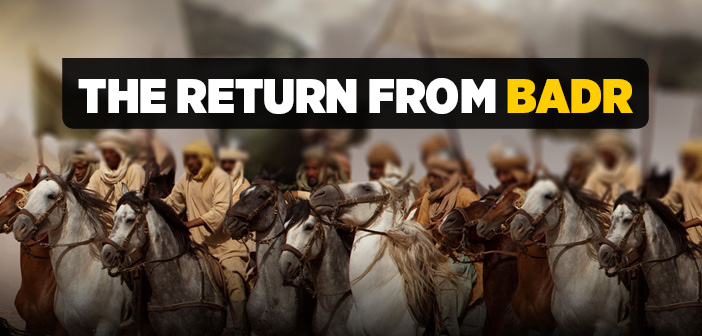What is an exceptional loyalty? What is loyalty?
The Blessed Prophet -upon him blessings and peace- remained in Mecca for fifteen days following the fath. The extended time of stay had a prominent number of the Ansar agitated, wary that the Prophet of Allah -upon him blessings and peace- would never return to Medina again. Allah, glory unto Him, had after all made him triumphant in a sacred and hallowed town where he was born and had spent a bulk of his life. Praying on the Hill of Safa at the time, the Blessed Prophet -upon him blessings and peace- sensed the anxiety of the Ansar. After finishing his prayer, he came next to them and asked, “What is it that you are talking about?”
The Ansar then gave full voice to their concerns, upon which the Noble Messenger -upon him blessings and peace-, exhibiting an exemplary display of loyalty, stated:
“I seek refuge in Allah from doing such a thing. I immigrated to your land. My life is your life; and so shall my death be next to you!”
The Ansar breathed an enormous sigh of relief. (Muslim, Jihad, 84, 86; Ahmad, II, 538)
The Blessed Prophet increased his thanks and gratitude to the Almighty following the fath of Mecca; the below dhikr especially in the ruqu and sajdah of his salats:
“I glorify Allah and negate His exalted Essence, at all times, from all the deficiencies improper to His Essence, Attributes, Actions and Names; venerate and thank Him with all the praises He deserves. I ask Allah to forgive me and repent for all my sins.”
When Aisha -Allah be well-pleased with her- asked the reason behind this prayer, the Blessed Prophet -upon him blessings and peace- explained, “My Lord had revealed to me that I would see a sign in my ummah, and when I did, to say this prayer a lot. I now see that sign.” (Muslim, Salat, 220)
Indeed, through surah Nasr, the Prophet of Allah -upon him blessings and peace- had been commanded to increase his repentance and glorification of the Almighty when he did ultimately receive Divine help and triumph, and saw people enter Islam in masses. The word nasr, eponymous with the name of the particular surah, has been interpreted with supremacy over all Arabs, and fath with the conquest of Mecca. Proceeding from the meaning of the word fath, which is ‘to open’, Ibn Abbas -Allah be well-pleased with him- labeled the triumph in Mecca as the fath of all faths, as it meant the ‘opening’ to Islam of a town in which stood the Sacred House, Kaabah. Fath is not a mere conquest of a land previously controlled by the enemy. It is rather the ‘opening’ of the hearts of the people therein to the religion of Allah, glory unto Him, and in turn, the ‘opening’ of the gates of Islam to them, and ultimately, to entire humankind. On that day, the Blessed Prophet -upon him blessings and peace- did not so much conquer a town as ‘open’ the hearts of her dwellers to Islam. The fath of Mecca has therefore been regarded the beginning of Islam’s march in opening the world to Islam. The road to ‘opening’ all of Arabia and from there the entire world to Islam, first began with the ‘opening’ of the door of Kaabah. To be sure, it was an event the remainder of the tribes in Arabia had been waiting for, an episode on which their ultimate acceptance of Islam hinged. They were thinking, “Leave the man to deal first with his own tribe. If he is able to triumph over them that means he is a true prophet!” (Bukhari, Maghazi, 53)
According to a narration from Hasan Basri, when the Blessed Prophet -upon him blessings and peace- triumphed over Mecca, the Arabs commented, “If Muhammad -upon him blessings and peace- has been able to become victorious over the Meccans, when the Almighty protected them from the Elephant Army, then there is no way we could harm him!” That is when they begun entering the religion of Allah, glory unto Him, in masses. (Elmalılı, IX, 6236-6238)
Source: Osman Nuri Topbaş, The Prophet Muhammed Mustafa the Elect II, Erkam Publications





